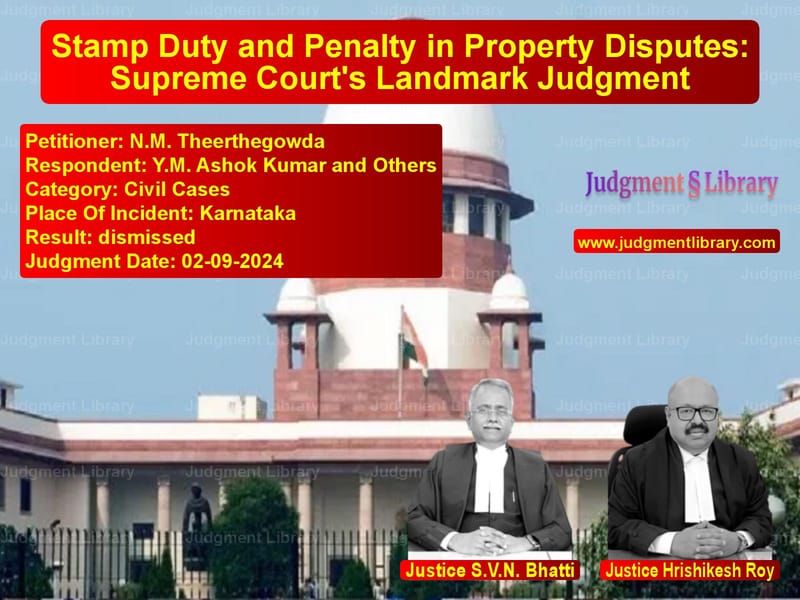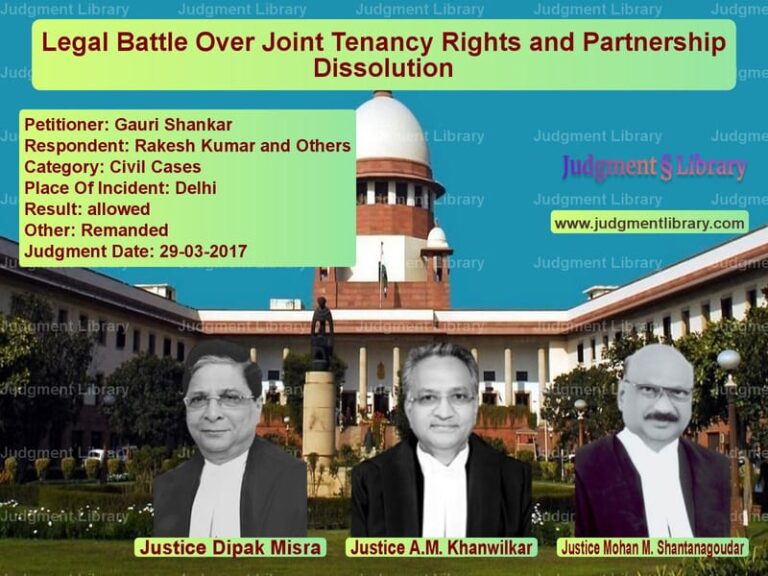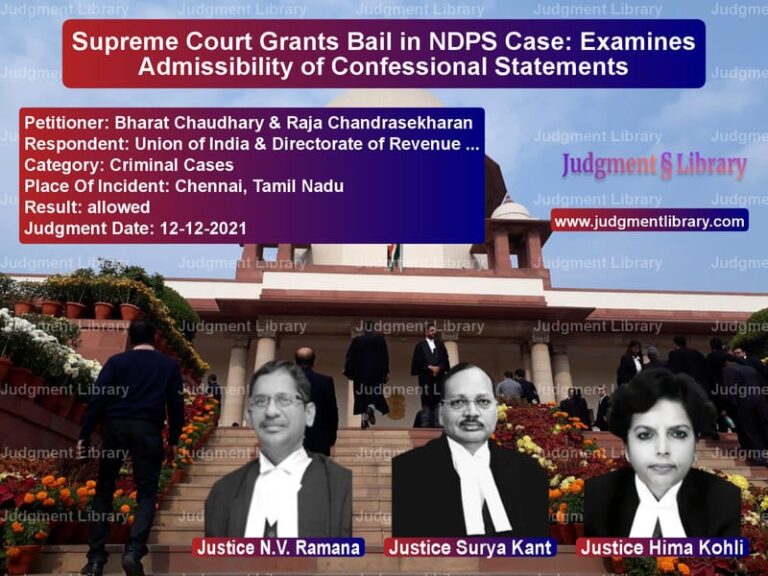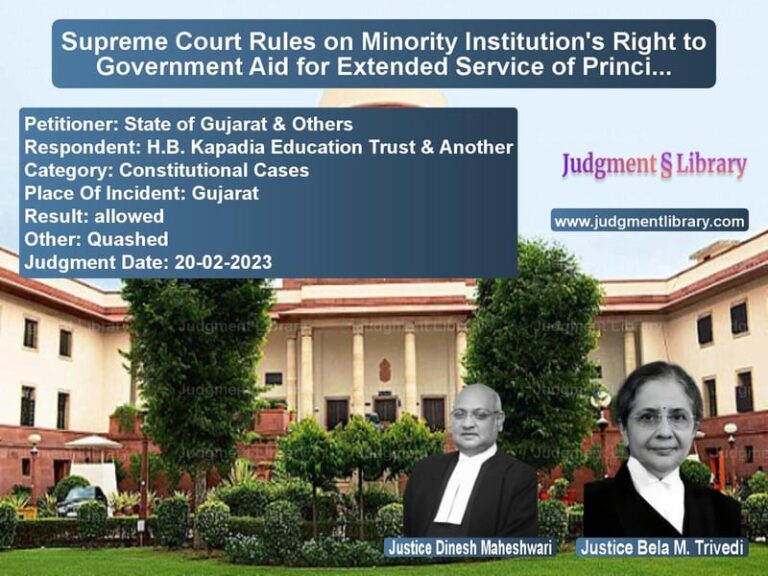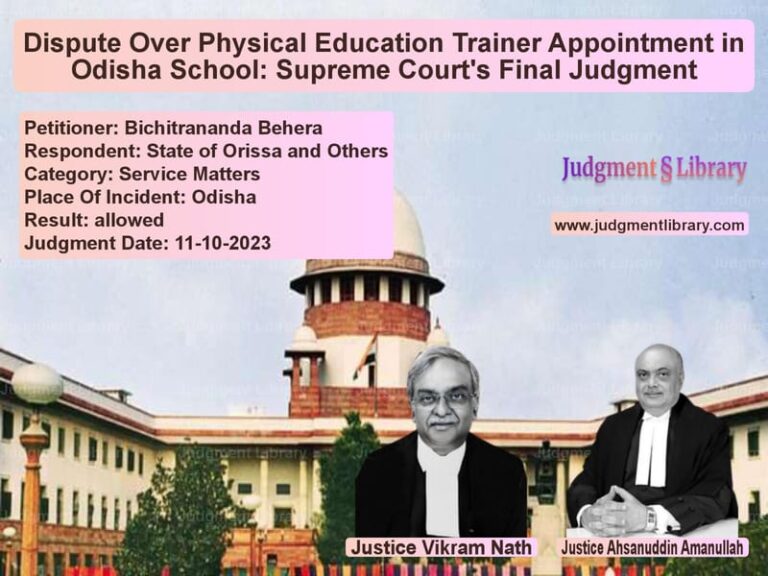Stamp Duty and Penalty in Property Disputes: Supreme Court’s Landmark Judgment
The Supreme Court of India recently delivered an important judgment in the case of N.M. Theerthegowda vs. Y.M. Ashok Kumar and Others, addressing the legal implications of stamp duty and penalties on unregistered agreements for sale. The case arose from a long-standing property dispute, where the appellant sought specific performance of an agreement for sale dated 04.11.1996.
The judgment highlights crucial aspects of stamp duty obligations under the Karnataka Stamp Act and clarifies the procedure for impounding documents. The ruling provides clarity on whether courts have the discretion to impose a lesser penalty than what is prescribed under the law.
Background of the Case
The appellant, N.M. Theerthegowda, filed a suit (O.S. No. 610 of 2015) seeking specific performance of an agreement for sale allegedly executed in 1996. Additionally, he sought to set aside a sale deed executed by the original owners in favor of a third party in 2003.
The case revolved around a key issue—whether an unregistered agreement of sale written on a stamp paper worth only Rs. 200/- could be admitted as evidence without paying the appropriate stamp duty and penalty.
Legal Proceedings and Arguments
Appellant’s Arguments
- The appellant claimed that he was in possession of the suit property based on the agreement for sale.
- He argued that he was willing to pay the deficit stamp duty but challenged the imposition of a ten-times penalty.
- The appellant contended that the trial court should have sent the document to the District Registrar for adjudication under Section 39 of the Karnataka Stamp Act instead of directly imposing a penalty under Section 34.
Respondents’ Arguments
- The respondents argued that the agreement was insufficiently stamped and could not be relied upon unless the required duty and penalty were paid.
- They contended that, as per the law, the penalty imposed had to be ten times the deficit stamp duty, and the court had no discretion to reduce it.
- The respondents cited previous judicial precedents where similar penalties had been upheld.
Supreme Court’s Observations
Justice S.V.N. Bhatti, delivering the judgment, made crucial observations regarding the application of stamp duty laws. The Court reiterated that:
“No discretion is granted to the Court to impose a lesser penalty. A power is vested in Civil Court to impound the document.”
The Court further analyzed the steps under Chapter IV of the Karnataka Stamp Act and referred to a previous judgment summarizing the legal position:
“The person who intends to rely on an insufficiently/improperly stamped instrument has the option to submit to the scope of Section 34 of the Act, pay duty and penalty. The party also has the option to directly move an application under Section 39 of the Act before the District Registrar, and have the deficit stamp duty and the penalty as may be imposed collected.”
The Supreme Court observed that since the appellant had voluntarily invited the trial court to decide on the penalty under Section 34, he could not later argue that the document should have been sent to the District Registrar instead.
Key Rulings of the Supreme Court
- The appellant’s argument that the trial court should have sent the document to the District Registrar was rejected.
- The Court upheld the imposition of a ten-times penalty on the deficit stamp duty, reaffirming that no discretion exists to reduce the amount.
- The High Court’s decision rejecting the appellant’s writ petition was affirmed.
- The appeal was dismissed, with the Court ruling that the penalty was correctly imposed.
Implications of the Judgment
The Supreme Court’s ruling has far-reaching implications for property transactions and disputes related to insufficiently stamped agreements:
- Courts do not have the discretion to reduce penalties on insufficiently stamped documents.
- Parties relying on unregistered agreements must ensure that proper stamp duty is paid to avoid legal hurdles.
- The judgment strengthens the enforceability of stamp duty laws and ensures compliance with statutory requirements.
Conclusion
This judgment serves as a vital precedent for cases involving the enforceability of agreements with insufficient stamp duty. It reinforces that legal obligations regarding stamp duty cannot be bypassed and that courts must adhere to the strict provisions of the law when imposing penalties. Property buyers and sellers must take note of these legal requirements to avoid unnecessary litigation and financial liabilities.
Petitioner Name: N.M. Theerthegowda.Respondent Name: Y.M. Ashok Kumar and Others.Judgment By: Justice S.V.N. Bhatti, Justice Hrishikesh Roy.Place Of Incident: Karnataka.Judgment Date: 02-09-2024.
Don’t miss out on the full details! Download the complete judgment in PDF format below and gain valuable insights instantly!
Download Judgment: n.m.-theerthegowda-vs-y.m.-ashok-kumar-and-supreme-court-of-india-judgment-dated-02-09-2024.pdf
Directly Download Judgment: Directly download this Judgment
See all petitions in Contract Disputes
See all petitions in Property Disputes
See all petitions in Specific Performance
See all petitions in Judgment by S.V.N. Bhatti
See all petitions in Judgment by Hrishikesh Roy
See all petitions in dismissed
See all petitions in supreme court of India judgments September 2024
See all petitions in 2024 judgments
See all posts in Civil Cases Category
See all allowed petitions in Civil Cases Category
See all Dismissed petitions in Civil Cases Category
See all partially allowed petitions in Civil Cases Category

